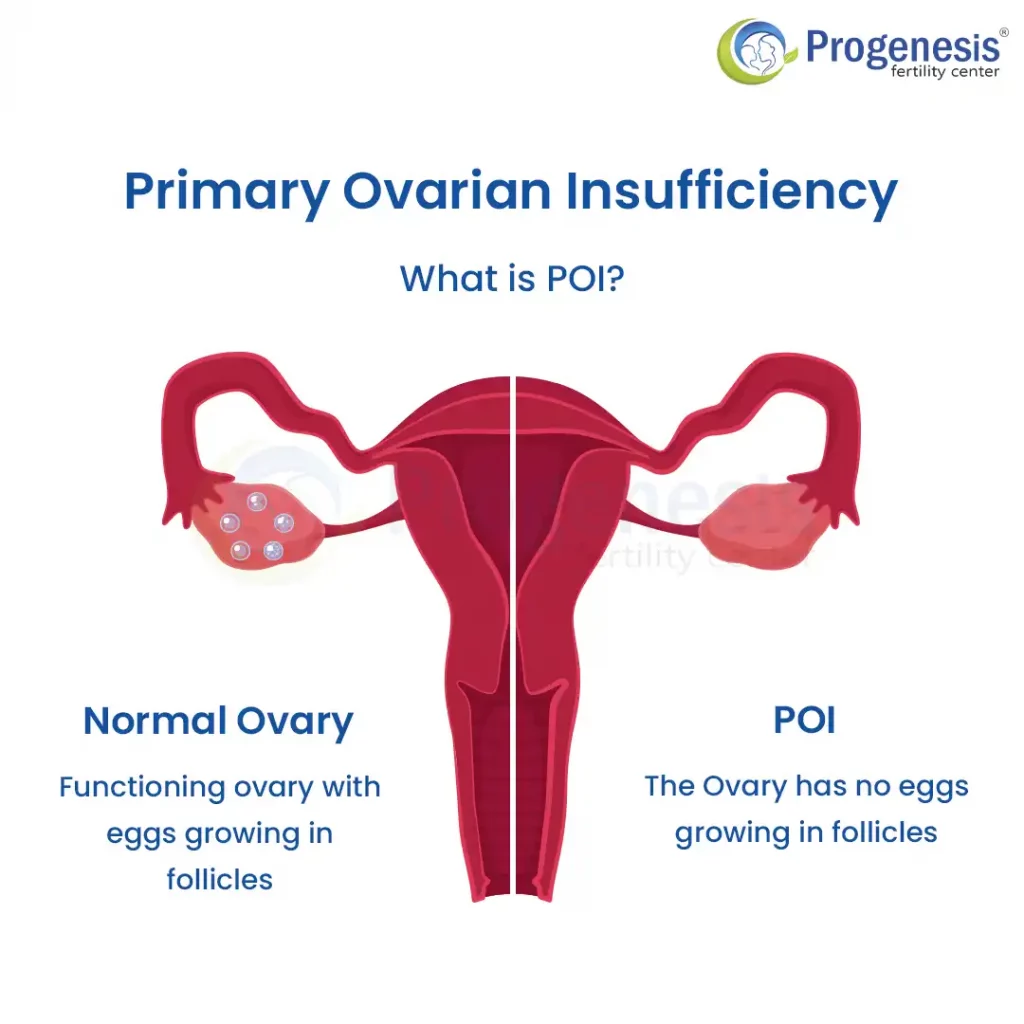What is Primary Ovarian Insufficiency?
Primary ovarian insufficiency occurs when the ovaries stop functioning properly before the age of 40. The ovaries do not produce normal amounts of estrogen or release eggs on a regular basis during early menopause. Infertility is rather common during this period. However, with treatment and counseling, a woman with this condition may become pregnant.

What happens in POI?
- The ovaries either stop releasing eggs (“ovulation”) or release them infrequently.
- The ovaries can stop generating estrogen and progesterone or generate them only occasionally.
- A person with POI is unlikely to be able to become pregnant naturally since the ovaries do not function consistently.
Symptoms of POI
Primary ovarian insufficiency symptoms are similar to menopause or insufficient estrogen. They are as follows:
- Period irregularity or absence. This medical condition could last for years. It may also appear after a pregnancy or after discontinuing birth control medications.
- Having difficulty becoming pregnant.
- Night sweats and hot flushes.
- Dryness in the vaginal cavity.
- Feeling of anger, sadness, or anxiety may arise
- Problems with concentration or memory.
- There is less sexual drive.
Causes of POI
The reason for early ovarian insufficiency is unknown in the majority of instances. POI can be caused by the following factors:
- Auto-immune illnesses, like thyroid or diabetes
- Genetic causes (if the illness runs in your family)
- Surgical operation to remove the ovaries
- Treatments for cancer such as chemotherapy or radiation
Diagnosis of premature ovarian insufficiency
To detect that you have POI, your doctor will consider the following:
- Your age
- Symptoms, such as irregular periods
- Signs of estrogen insufficiency
- A family history of early menopause
- A medical history that includes other autoimmune disorders.
- A blood test to determine your hormone levels (FSH, AMH, and oestrogen) A blood test to screen for diabetes and thyroid disorders
How to get pregnant with premature ovarian insufficiency?
Women who have POI do not ovulate (release an egg) on a monthly basis. This can make it difficult for them to conceive.
However, studies have revealed that a tiny percentage of women (5-10%) with unexplained premature ovarian failure ovulate and become pregnant occasionally.
According to specialists, if you have POI and are struggling to conceive, you may be able to get eggs from a donor. In vitro fertilization (IVF) is used for donor egg treatment.
The process of in vitro fertilization (IVF) using donor eggs involves removing mature eggs from the ovary of an anonymous female donor. The donor must pass a battery of tests to be eligible to donate eggs. Once fertilized with her partner’s sperm, the resulting embryo is transferred to her uterus, where it is implanted and turns into a pregnancy.
Similar blog:
FAQ’s
1. What is the life expectancy of a woman with premature ovarian failure?
The life expectancy of women with primary ovarian insufficiency (POI) is two years less than that of women without POI. Sexual life, emotional and cognitive health, fertility, bone health, and cardiovascular health may all be negatively impacted by the condition.
What happens if premature ovarian failure is left untreated?
If neglected, ovarian insufficiency can lead to deteriorating heart disease, dry eye syndrome, depression, and osteoporosis.
What causes premature ovarian failure weight gain?
Hormone fluctuations can lead some women to retain more water or create more gas than they did before menopause. Reduced activity might also aggravate bloating. Women frequently blame menopause for weight gain, yet most cases of weight increase are caused by decreased exercise levels and dietary changes.
Is there a connection between premature ovarian failure and diabetes?
POI occurs in 10% of instances of an autoimmune polyglandular syndrome, where it is associated with thyroid illness, type 1 diabetes mellitus, and Addison’s disease. There is no correlation between the presence of menopause in women with diabetes and women without diabetes.
Can you reverse premature ovarian failure?
There is currently no treatment that can totally restore a woman’s normal ovarian functions. Hormone replacement therapy (HRT) can, however, be beneficial. HRT is a frequent therapeutic option for women who have early ovarian failure.
